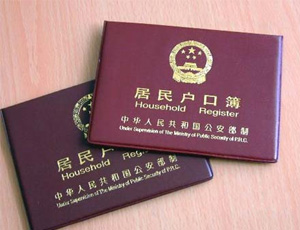Getting Your Employees a Hukou – An Unavoidable HR Issue in China
By Vivian Ni
 May. 4 – Among the numerous lessons foreign employers need to learn about as they establish a business in China, getting their employees a hukou – the official household registration record that enables immigrants to enjoy treatment equal to that of a city’s permanent resident – is one of the unavoidable issues that they have to understand and tackle.
May. 4 – Among the numerous lessons foreign employers need to learn about as they establish a business in China, getting their employees a hukou – the official household registration record that enables immigrants to enjoy treatment equal to that of a city’s permanent resident – is one of the unavoidable issues that they have to understand and tackle.
As Shanghai’s hukou is specifically attractive and significant to the numerous Chinese immigrant workers that rush to the municipality every year, employers in the city may often be requested to provide related paperwork to assist with the Shanghai hukou or residence permit applications of their employees that hold residence records outside the city. Therefore, it is crucial for business owners to understand what it takes to prepare effective paperwork for such employees and how the company’s liabilities to cover those employees’ social welfare vary according to their hukou status.
Obtaining a Shanghai hukou is generally a long way to go for most immigrant workers. According to Circular [2009] No.7 issued by the Shanghai Municipal Government, most immigrants need to hold a “Shanghai Residence Permit” for seven years and meet other standards before becoming qualified Shanghai hukou applicants. In the process of obtaining and renewing the residence permit, as well as applying for the hukou, there will always be something the employees ask from their employers.
Applying for a Shanghai residence permit
A Shanghai residence permit is a smart card that holds a person’s identifying information. There are three types of permits available to be issued to different groups of people, which are defined as introduced talents (Type A), general employees or employers (Type B), and school attendants (Type C). The general validity period of the permit lasts one year, while Type A applicants could apply for a permit that lasts three or five years. However, the permit’s validity duration shall not exceed the effective period of the applicant’s labor contract.
Individuals that are eligible for a Shanghai residence permit application shall be:
- An introduced talent that holds a bachelor’s (or above) degree or a special talent and comes to Shanghai for working, investment or entrepreneurship purposes; and includes the individual’s spouse as well as any unmarried children under the age of 18 (qualified for Type A)
- An employee or employer that boasts a stable job and stable residency in Shanghai (qualified for Type B)
- A person that comes to live with his/her spouse, child or parent that has a Shanghai hukou; or one who studies in a Shanghai college, as well as one who has the need to reside in Shanghai for over six months in order to receive non-formal education (qualified for Type C)
All residence permit applicants shall provide the following materials to get started:
- A residence registration form
- An effective identity certificate
- A residency certificate that proves the applicant will stay in Shanghai for more than six months, such as an ownership certificate of one’s self-owned property, a rental contract filing record issued by a local real estate authority, a dormitory residency proof issued by one’s employer, or a boarding proof issued by the Residents’ Committee in one’s neighborhood
- A health status certificate issued by a hospital above district-level
- For applicants aged from 18 to 49, information on marital status and children is also required.
In addition to the fundamental materials mentioned above, people who apply for the Type A permit shall also provide:
- A recommendation letter from the company’s human resource department
- One’s academic credentials and corresponding authority verification
- Copies of the company’s business license and organization code
- One’s residence registration record (hukou) in the area one comes from
- A copy of one’s labor contract that lasts longer than one year and has more than six months left before the contract expires; or a related investment or entity establishment certificate from an applicant who looks to invest or establish his/her own enterprise in Shanghai
- One’s personal file accessing information
The spouse or any children of a Type A applicant who also apply for the residence permit are required to provide:
- A copy of the marriage certificate; proof of the parent-child relationship
While asked to provide the same fundamental materials, an employee or employer who applies for a Type B permit shall also provide:
- One’s employment registration certificate issued by Shanghai’s labor and social security administration
- One’s labor contract that lasts over six months
- One’s social insurance payment records
A person who has a special job such as one that is hazardous to human health or has high risk shall provide his/her employment certificate. An investor, entrepreneur, or individual business owner shall provide his/her business license and social insurance payment records.
An employer that wants to help with their employees’ application for a Type A residence permit shall meet the following standards:
- The company shall have a registered capital of no less than RMB1 million; however, such a requirement is dropped in an enterprise that is knowledge-intensive, technology-intensive or high-tech intensive, as well as a start-up enterprise that is established by college graduates
- If the employee is hired at a branch company, its parent company with a legal personality shall have a registered capital of no less than RMB10 million
- The employer shall not just be a representative office in Shanghai
As the first step of Type A residence permit application, the employer shall register itself on www.21cnhr.gov.cn and go through the related authorities’ verification.
Renewing a ‘Type A’ residence permit
As mentioned earlier, according to the validity period of one’s residence permit, a person may need to renew his/her permit every year or every three/five years. The materials required from the applicant during the renewal are as follows:
- A recommendation letter from the company’s HR department and the involved HR official’s ID card
- An application form for Shanghai residence permit
- The applicant’s ID card and Shanghai residence permit
- The applicant’s individual income tax (IIT) and social insurance payment records over the latest one year when his/her residence permit was valid
Although the materials needed during the renewal process are less complicated, the applicant shall still provide all the related company and labor contract information if his/her employer has been different from the one he/she stayed with during last time’s application. This also means one’s employer shall also meet the required standards mentioned in our last section when the employee goes to refresh his/her residence permit.
In addition, same as the first time, companies are also required to update or register their corporate information online during the renewal.
Obtaining a Shanghai hukou
In general, individuals who hold a Shanghai residence permit for an accumulative seven years can apply for a Shanghai hukou. However, in addition to the seven-year requirement, an individual shall also have the following qualifications to be an eligible hukou applicant:
- Completing an accumulative seven-year urban social insurance payment during the time when the person holds the Shanghai residence permit
- Completing one’s IIT payment during the time when the person holds the Shanghai residence permit
- Working at an intermediate-level professional or technical position, or having a technician-level (or above) vocational qualification
- Having no criminal record
People who work as high-level technicians, work in specific positions in suburban areas, or pay a high IIT or social insurance rate, may watch out for related favorable policies for them so that they do not need to wait seven years for the Shanghai hukou application.
Graduates that have received their higher education degrees overseas – if meeting all the related requirements – can apply for a Shanghai hukou as soon as they come back to Shanghai. Such privilege can last two years, calculating from the first day of their return.
For companies, employees’ hukou status influences how much employers are liable for through Shanghai’s social welfare program. The coverage of urban social insurance – which includes pension, medical insurance, unemployment insurance, maternity insurance, work-related injuries insurance and housing fund – will cost a company a lot more than just paying for comprehensive social insurance, which only covers work-related injuries, hospitalization insurance, and elderly subsidies.
If an employee has a rural hukou outside Shanghai and holds a Type B or Type C Shanghai residence permit, the employer only needs to pay for his/her comprehensive social insurance.
If an employee has a rural hukou outside Shanghai but holds a Type A Shanghai residence permit, he/she has the right to ask the employer to cover his/her urban social insurance.
If an employee has an urban hukou in or outside Shanghai, no matter what type of Shanghai residence permit he/she holds, the employer is liable for covering his/her urban social insurance.
Dezan Shira & Associates is a boutique professional services firm providing foreign direct investment business advisory, tax, accounting, payroll and due diligence services for multinational clients in China. For more information on what your responsibilities are as an employer, you can contact the firm at info@dezshira.com or visit www.dezshira.com.
Related Reading
 Doing Business in China
Doing Business in China
Our 156-page definitive guide to the fastest growing economy in the world, providing a thorough and in-depth analysis of China, its history, key demographics and overviews of the major cities, provinces and autonomous regions highlighting business opportunities and infrastructure in place in each region. A comprehensive guide to investing in China is also included with information on FDI trends, business establishment procedures, economic zone information, and labor and tax considerations. Priced at US$40 (PDF)
 Employment Overheads in China’s Welfare System
Employment Overheads in China’s Welfare System
In this issue of China Briefing we look at China’s social security regime and the five social insurance funds that enterprises in China must contribute to: pension, medical insurance, unemployment insurance, maternity insurance, and occupational injury insurance.
 Human Resources in China
Human Resources in China
Specifically designed to cover the most important issues relating to managing a Chinese workforce, this guide details the HR issues that both local managers in China and investors looking to establish a presence on the mainland should be aware about.
China’s HR Market: How Much Are Your Employees Worth?
China’s Labor Laws Need a Re-Think
China’s New Social Insurance Law
China Kicks Off Once-a-Decade Population Census
Mainland Media Presses for Hukou Reform
- Previous Article China’s Energy Strategy and the Role of Gov’t Oil in Africa
- Next Article Beijing Government Issues Circular on Collection of Union Fees




























